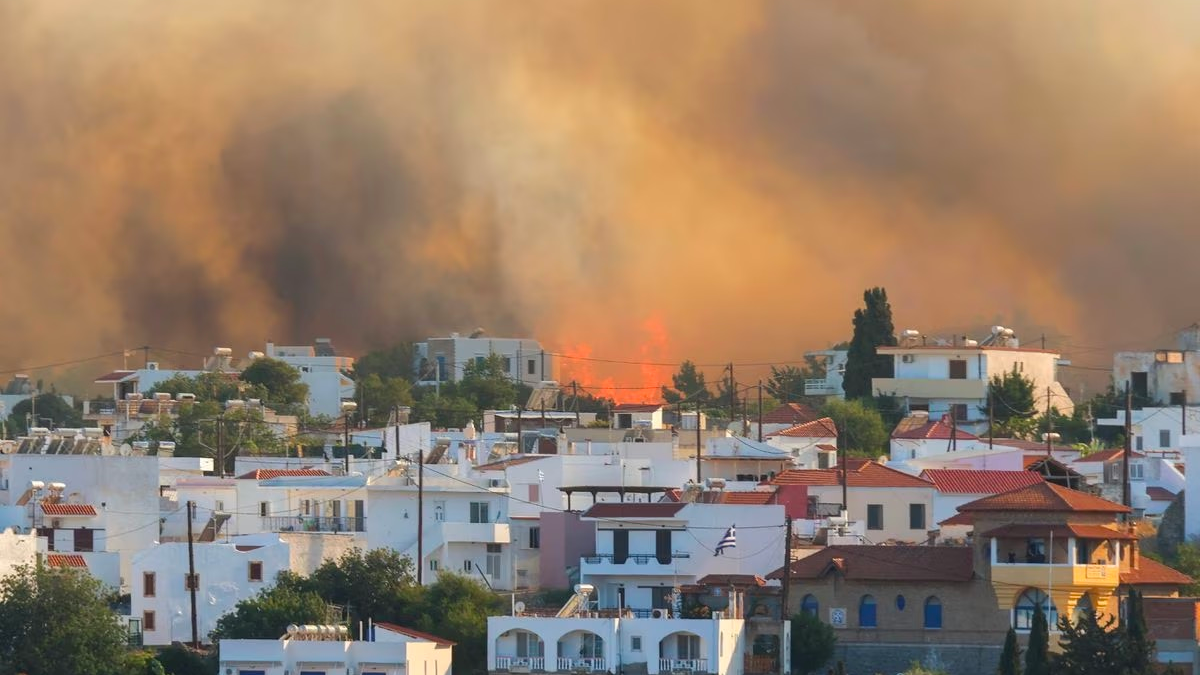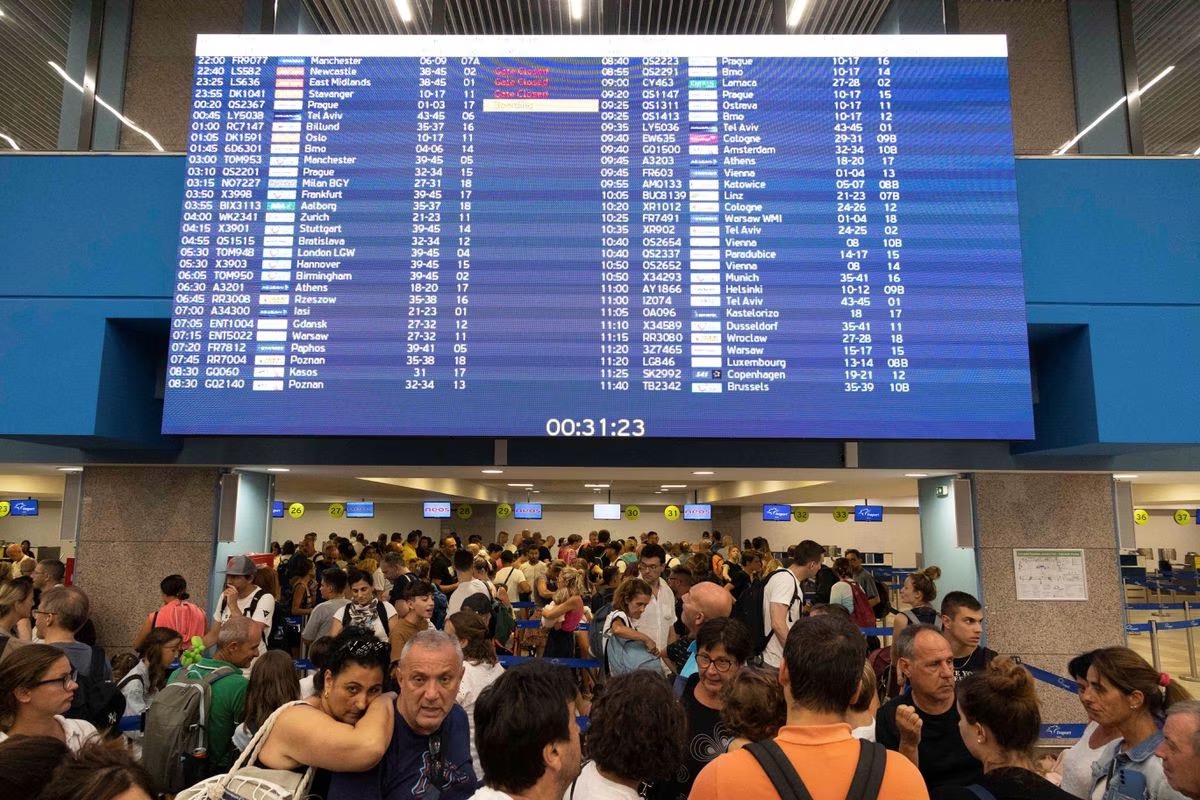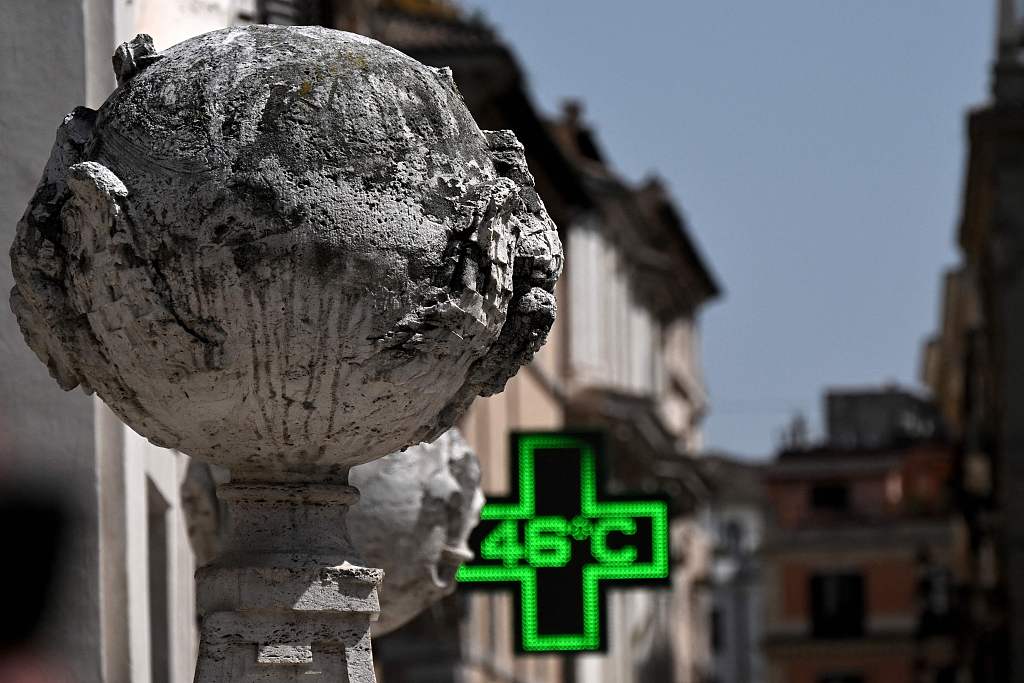
Flames and smoke rise as a wildfire burns near the village of Gennadi, on the island of Rhodes, Greece, July 25, 2023. /Reuters
Flames and smoke rise as a wildfire burns near the village of Gennadi, on the island of Rhodes, Greece, July 25, 2023. /Reuters
The Mediterranean region, renowned for its picturesque coastlines, rich cultural heritage and tourist attractions, is currently facing a distressing situation. Unprecedented levels of scorching heat have swept across the area, with temperatures soaring well beyond the usual seasonal averages.
Amid the intense heat waves, which have sparked wildfires, many tourists have found their summer holidays unexpectedly impacted, with their travel plans disrupted.
In Rhodes, a popular holiday destination southeast of mainland Greece, wildfires have lasted a week, forcing thousands to flee hotels and resorts on the Greek islands.
"We missed our flight because all the roads were closed because the flames crossed the road," said Helen, a British tourist who traveled to Rhodes with her daughter.
"We have been here longer, so we are very exhausted, and we just want to get home," she told CGTN.
She recounted the unsettling situation, saying, "There was orange and black smoke coming over, but we were told we were not near the fire and were safe. Then the smoke got thicker, and we had to be evacuated. It was very scary and hot from the flames, and the smoke was very hot."
Helen was among the thousands of tourists forced to flee Rhodes. As of Tuesday, nearly 3,000 tourists had been flown back home, according to the Transport Ministry's records.

Tourists line up at check-in counters as they wait for departing planes at the airport, after being evacuated following a wildfire on the island of Rhodes, Greece, July 24. /Reuters
Tourists line up at check-in counters as they wait for departing planes at the airport, after being evacuated following a wildfire on the island of Rhodes, Greece, July 24. /Reuters
Dwindling tourist numbers
The relentless heat has discouraged tourists from coming to the region during this holiday season.
Beaches, usually bustling with sun-seeking vacationers, now see sparse crowds seeking shelter from the sweltering sun. The rising temperatures have rendered sightseeing and outdoor activities uncomfortable, leading many tourists to either delay or cancel their travel plans to the region.
What's worse, the looming threat of wildfires has compelled many tourists to reconsider their trips due to safety concerns. This has resulted in a decline in visitor numbers, dealing a severe blow to the tourist industry, a cornerstone of the Greek economy. According to the World Travel & Tourism Council, the travel and tourism sector contributed 18.5 percent to Greece's economy last year.
Apart from Greece, other countries like Spain and Italy have also witnessed adverse effects on their tourism industries. Once-thriving tourist hotspots are now experiencing a noticeable decline in footfall.
Meanwhile, the hospitality industry, heavily reliant on tourism, is facing its own set of challenges as hotel bookings decrease. With tourists either canceling their trips or seeking alternative destinations, hotel owners are finding ways to adapt, offering indoor facilities and amenities to entice guests to stay despite the heat.

A pharmacy's sign indicates a temperature of 46 degrees Celsius in Rome, Italy, on July 18, 2023. /VCG
A pharmacy's sign indicates a temperature of 46 degrees Celsius in Rome, Italy, on July 18, 2023. /VCG
More frequent heat waves possible in the future
While Europe has witnessed its fair share of summer heat waves, the current temperatures are rewriting history. The UN weather agency warns that the continent, influenced by climate change, could surpass the scorching 48.8-degree Celsius record set in Sicily just two years ago.
During a Geneva briefing, Panu Saaristo, the emergency health team leader for the International Federation of Red Cross and Red Crescent Societies, emphasized that heat waves are a deadly, although invisible, threat. He pointed out that Europe experiences increasingly hotter temperatures for longer durations each summer.
Yet the impact of soaring temperatures isn't limited to Europe alone. All around the globe, heat records are being shattered, leading scientists to predict that 2023 may be registered as the hottest year in history.
In recent years, heat waves have become more frequent due to human-induced warming, according to a scientific study published on Tuesday by World Weather Attribution, an academic collaboration group studying the role played by climate change in extreme weather.
Heat waves are among the deadliest natural hazards, with thousands of people dying from heat-related causes each year, the study shows. But typically, these events had been "extremely rare." For instance, the heat wave would come once every 15 years in southern Europe.
The study estimates that if average global temperatures rise two degrees Celsius above the preindustrial climate, prolonged periods of extreme heat, like the recent ones, could recur every two to five years.
"This is what climate change looks & feels," Dr Friederike Otto, a climatologist and senior lecturer at the Grantham Institute for Climate Change and the Environment in London, who contributed to the research, said via Twitter.
"We need to adapt, we need to stop making it worse."